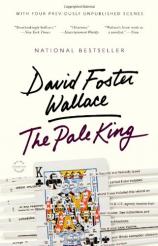The Pale King
Review
The Pale King
As I began my review of David Foster Wallace's THE PALE KING, I was struck by an ominous thought. Perhaps this assignment has caused me to bite off far more than I can chew. My concern comes from repeated articles, comments and reviews of the book appearing in national publications and major web pages. Almost all of the writing comes from authors who are best described as Wallace fanatics, a term I use with its best meaning in mind. This group can tell you everything about Wallace and his writing. In comparison, before THE PALE KING, my only exposure to this fellow central Illinoisan was reading his short story "Ticket to the Fair," a selection read because the piece was recommended as a classic portrayal of the Illinois State Fair. I was not disappointed by it, but I never seemed to find reading time for any of his other works.
Wallace has been called one of the most innovative and influential contemporary American writers. Time magazine included his 1995 novel, INFINITE JEST, in its list of 100 greatest novels of the late 20th century. Wallace's father, James, was a Philosophy professor at the University of Illinois, and his mother, Sally, an English professor at Parkland Community College. As a graduate student he won numerous writing awards and saw his student thesis published as a first novel. But his genius came at a cost. In 2008, at the age of 46, Wallace committed suicide. After his death, his father revealed that for 20 years he had taken medication for depression.
At the time of his death, Wallace was completing THE PALE KING. His wife and agent found the manuscript that would be edited by Michael Pietsch. Wallace also left notes to the novel that suggest there would be no traditional ending or plot to his final work. The book takes place during the 1980s and the presidency of Ronald Reagan. Its setting is Peoria, Illinois, and the Internal Revenue Service Regional Center in that community. While the narrator identifies himself as David Foster Wallace, he is difficult to pinpoint with any precision. The book consists of numerous episodes arranged by the editor from Wallace's notes. These individual pieces are more like short stories than a complete novel, but they are nonetheless beautiful portrayals of tedium and routine.
A novel that bases itself upon the IRS and how taxes are determined and collected is obviously quite unique. Wallace often observed how pop culture influenced American life. THE PALE KING examines life from the other end of the microscope --- how details and pointless rules overwhelm individuality.
In addition to the ersatz Wallace, the story is told through the eyes of the clerks at the IRS center. Chris Acquistipace, Dave Cusk, Boris Kratz, Anand Singh and Latrice Theakston are some of the bureaucrats who are slaves to the tedium of government minutia. The story cannot be told through the eyes of one person because it is only through the tedium of many that the hell of boredom becomes apparent. It is the life that most lead no matter what their job. Most readers will recognize their lives in Wallace's portrayals.
THE PALE KING is not a book for those unfamiliar with David Foster Wallace. It is not a finished product, and his writing legacy contains far better works. It is appropriate to leave this unfinished novel and its deeper analysis to those far better versed in his legacy. Indeed, the book, like a fine wine, may require many years on the shelf to reach its maturity. But the enthralling glimpses of a brilliant writer are there on the pages to be savored for years to come, and to remind us that Wallace's death deprived contemporary literature of a shining star.
Reviewed by Stuart Shiffman on May 2, 2011
The Pale King
- Publication Date: April 10, 2012
- Genres: Fiction
- Paperback: 592 pages
- Publisher: Back Bay Books
- ISBN-10: 0316074225
- ISBN-13: 9780316074223





